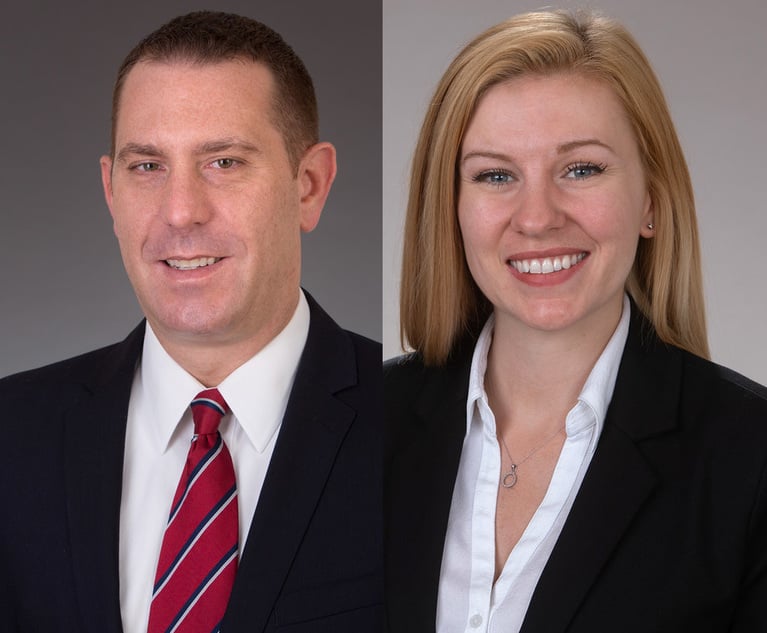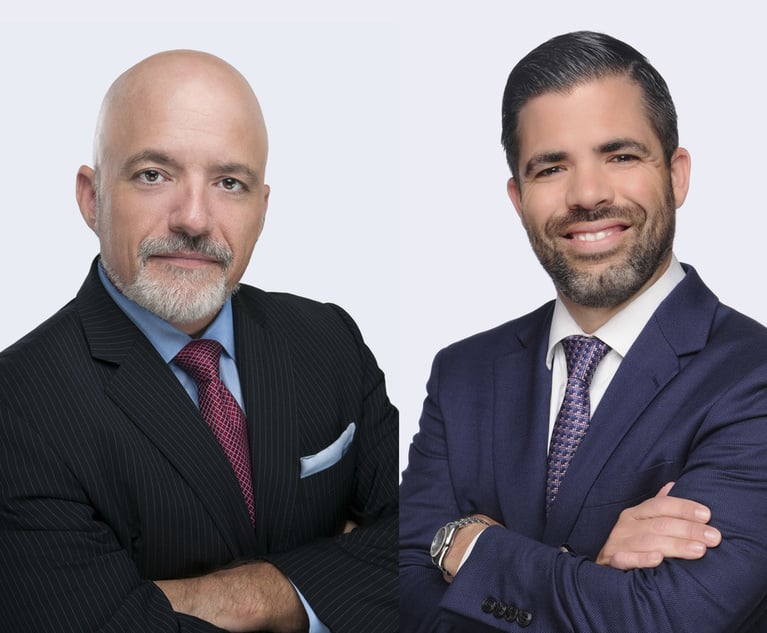#MeToo—Sexual Harassment and Insurance. Is Your Business Covered?
As more and more sexual harassment and sexual assault claims come to light in all realms, including Hollywood, the judiciary and Congress, it is important to ensure that your business is prepared to manage any such allegations with adequate insurance coverage.
February 28, 2018 at 11:00 AM
4 minute read
 Katherine Miller and Walter J. Andrews, Hunton & Williams.
Katherine Miller and Walter J. Andrews, Hunton & Williams.
As more and more sexual harassment and sexual assault claims come to light in all realms, including Hollywood, the judiciary and Congress, it is important to ensure that your business is prepared to manage any such allegations with adequate insurance coverage. This includes ensuring you have the proper insurance policies in place and that the exclusions of these policies do not bar coverage for these types of allegations.
These claims can arise in a number of ways. If your business is subject to the Florida Civil Rights Act of 1992 or Title VII of the Civil Rights Act of 1964, it could face a sexual harassment claim filed by an employee, alleging quid pro quo harassment, such as demanding a raise in exchange for a sexual act, or that there is a hostile work environment that interferes with the employee's performance, including the making of constant, unwanted sexual comments. An employee may also bring a lawsuit directly against the alleged perpetrator or a director or officer of the company for a tort claim arising from the harassment or assault. Or alternatively, a customer or other third party may bring suit alleging negligent hiring or negligent retention if an employee sexually assaults or harasses him or her.
A commercial general liability policy, which covers a business' liability for bodily injury and property damage arising out of an occurrence, may not cover these types of claims. The plaintiff's damages will likely be solely for emotional distress and will not constitute “bodily injury,” or the insurer will argue that no accidental “occurrence” has been alleged because the harassment was intentional. And even so, most commercial general liability policies exclude coverage for bodily injury to an employee arising out of his employment with the insured (employer's liability exclusion) or include an exclusion for employment-related practices, including wrongful termination or harassment. This is likely because this coverage is provided under separate insurance policies.
It is thus important to ensure that you have these additional policies in place, including a separate policy for employment practices liability insurance (EPLI), if your business faces these risks. EPLI policies cover an insured's liability for wrongful acts in the employment process. This includes coverage for wrongful termination, sexual harassment, retaliation and employment-related defamation, among other things. An EPLI policy will usually also cover directors and officers, management, and employees as insureds. However, it should be noted that claims of harassment brought by third parties that are not employees are not typically covered under EPLI policies. Thus, an insured will need to secure an endorsement providing this additional coverage for third parties. Or alternatively, this additional coverage may be provided as an add-on under a directors and officers liability insurance (D&O) policy. D&O policies cover the wrongful acts of directors and officers and potentially the organization for wrongful acts committed in their scope of their duties as directors and officers. Another source of potential coverage for an individual is under a personal homeowner's policy. While these policies typically exclude losses arising out of an insured's business pursuits, these policies should still be reviewed to determine whether coverage is available.
And even if you secure these additional coverages, it is important to review the provisions closely. Many policies are subject to an intentional acts exclusion providing that there is no coverage for intentional or willful acts or alternatively for the willful, intentional violation of a legal duty. This is problematic if the exclusion is interpreted broadly because most allegations of sexual assault or harassment are for willful, intentional behavior. Thus, any intentional acts exclusion should be removed or significantly narrowed. And lastly, it is important that policy periods and retroactive dates account for the applicable statute of limitation for these types of claims, particularly given how many years have passed since some of the alleged misconduct first occurred before they are reported.
In sum, it is important to review your insurance coverages carefully to ensure your business is prepared in the event of sexual assault or harassment claim, including ensuring you have adequate EPLI coverage and that no exclusions will bar coverage otherwise.
Walter J. Andrews, a partner at Hunton & Williams, focuses his practice on complex insurance litigation, counseling and reinsurance arbitrations and expert witness testimony.
Katherine Miller, an associate at the firm, focuses her practice on complex business litigation with an emphasis on insurance coverage counseling and litigation.
This content has been archived. It is available through our partners, LexisNexis® and Bloomberg Law.
To view this content, please continue to their sites.
Not a Lexis Subscriber?
Subscribe Now
Not a Bloomberg Law Subscriber?
Subscribe Now
NOT FOR REPRINT
© 2025 ALM Global, LLC, All Rights Reserved. Request academic re-use from www.copyright.com. All other uses, submit a request to [email protected]. For more information visit Asset & Logo Licensing.
You Might Like
View All
Trending Issues in Florida Construction Law That Attorneys Need to Be Aware Of
6 minute read


Trending Stories
- 1Gunderson Dettmer Opens Atlanta Office With 3 Partners From Morris Manning
- 2Decision of the Day: Court Holds Accident with Post Driver Was 'Bizarre Occurrence,' Dismisses Action Brought Under Labor Law §240
- 3Judge Recommends Disbarment for Attorney Who Plotted to Hack Judge's Email, Phone
- 4Two Wilkinson Stekloff Associates Among Victims of DC Plane Crash
- 5Two More Victims Alleged in New Sean Combs Sex Trafficking Indictment
Who Got The Work
J. Brugh Lower of Gibbons has entered an appearance for industrial equipment supplier Devco Corporation in a pending trademark infringement lawsuit. The suit, accusing the defendant of selling knock-off Graco products, was filed Dec. 18 in New Jersey District Court by Rivkin Radler on behalf of Graco Inc. and Graco Minnesota. The case, assigned to U.S. District Judge Zahid N. Quraishi, is 3:24-cv-11294, Graco Inc. et al v. Devco Corporation.
Who Got The Work
Rebecca Maller-Stein and Kent A. Yalowitz of Arnold & Porter Kaye Scholer have entered their appearances for Hanaco Venture Capital and its executives, Lior Prosor and David Frankel, in a pending securities lawsuit. The action, filed on Dec. 24 in New York Southern District Court by Zell, Aron & Co. on behalf of Goldeneye Advisors, accuses the defendants of negligently and fraudulently managing the plaintiff's $1 million investment. The case, assigned to U.S. District Judge Vernon S. Broderick, is 1:24-cv-09918, Goldeneye Advisors, LLC v. Hanaco Venture Capital, Ltd. et al.
Who Got The Work
Attorneys from A&O Shearman has stepped in as defense counsel for Toronto-Dominion Bank and other defendants in a pending securities class action. The suit, filed Dec. 11 in New York Southern District Court by Bleichmar Fonti & Auld, accuses the defendants of concealing the bank's 'pervasive' deficiencies in regards to its compliance with the Bank Secrecy Act and the quality of its anti-money laundering controls. The case, assigned to U.S. District Judge Arun Subramanian, is 1:24-cv-09445, Gonzalez v. The Toronto-Dominion Bank et al.
Who Got The Work
Crown Castle International, a Pennsylvania company providing shared communications infrastructure, has turned to Luke D. Wolf of Gordon Rees Scully Mansukhani to fend off a pending breach-of-contract lawsuit. The court action, filed Nov. 25 in Michigan Eastern District Court by Hooper Hathaway PC on behalf of The Town Residences LLC, accuses Crown Castle of failing to transfer approximately $30,000 in utility payments from T-Mobile in breach of a roof-top lease and assignment agreement. The case, assigned to U.S. District Judge Susan K. Declercq, is 2:24-cv-13131, The Town Residences LLC v. T-Mobile US, Inc. et al.
Who Got The Work
Wilfred P. Coronato and Daniel M. Schwartz of McCarter & English have stepped in as defense counsel to Electrolux Home Products Inc. in a pending product liability lawsuit. The court action, filed Nov. 26 in New York Eastern District Court by Poulos Lopiccolo PC and Nagel Rice LLP on behalf of David Stern, alleges that the defendant's refrigerators’ drawers and shelving repeatedly break and fall apart within months after purchase. The case, assigned to U.S. District Judge Joan M. Azrack, is 2:24-cv-08204, Stern v. Electrolux Home Products, Inc.
Featured Firms
Law Offices of Gary Martin Hays & Associates, P.C.
(470) 294-1674
Law Offices of Mark E. Salomone
(857) 444-6468
Smith & Hassler
(713) 739-1250






